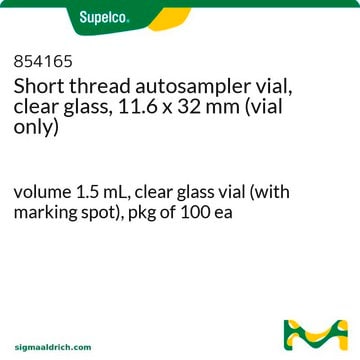89802
4-(Dimethylamino)azobenzene-4′-sulfonyl chloride
for HPLC derivatization, LiChropur™, 98.0-102.0% (AT)
Sinónimos:
4-(4-Dimethylaminophenylazo)benzenesulfonyl chloride, DABS-Cl, Dabsyl chloride
About This Item
Productos recomendados
grade
for HPLC derivatization
Quality Level
assay
98.0-102.0% (AT)
form
crystals
quality
LiChropur™
technique(s)
HPLC: suitable
mp
185 °C (dec.) (lit.)
SMILES string
CN(C)c1ccc(cc1)\N=N\c2ccc(cc2)S(Cl)(=O)=O
InChI
1S/C14H14ClN3O2S/c1-18(2)13-7-3-11(4-8-13)16-17-12-5-9-14(10-6-12)21(15,19)20/h3-10H,1-2H3/b17-16+
InChI key
VTVWTPGLLAELLI-WUKNDPDISA-N
¿Está buscando productos similares? Visita Guía de comparación de productos
Categorías relacionadas
General description
4-(Dimethylamino)azobenzene-4′-sulfonyl chloride, a well-known UV-labeling agent, is generally used for the derivatization of N-terminal amino acids, imidazole derivatives, polyamines, etc. prior to their chromatographic determination due to the former′s capacity to covalently bind to the substrates. Its derivatives typically absorb UV radiation between the range of 436-460 nm. This method of derivatization is regarded as superior compared to other methods owing to the simplicity of the procedure, high stability and reproducibility, best resolution of the analytes, etc.
Application
Legal Information
signalword
Danger
hcodes
Hazard Classifications
Skin Corr. 1B
Storage Class
8A - Combustible corrosive hazardous materials
wgk_germany
WGK 3
flash_point_f
Not applicable
flash_point_c
Not applicable
Choose from one of the most recent versions:
¿Ya tiene este producto?
Encuentre la documentación para los productos que ha comprado recientemente en la Biblioteca de documentos.
Nuestro equipo de científicos tiene experiencia en todas las áreas de investigación: Ciencias de la vida, Ciencia de los materiales, Síntesis química, Cromatografía, Analítica y muchas otras.
Póngase en contacto con el Servicio técnico
![4-[4-(Dimethylamino)phenylazo]benzoic acid N-succinimidyl ester ≥98.0% (HPLC)](/deepweb/assets/sigmaaldrich/product/structures/120/235/500b5276-3ce2-43b7-9588-3883f13d4ff7/640/500b5276-3ce2-43b7-9588-3883f13d4ff7.png)





